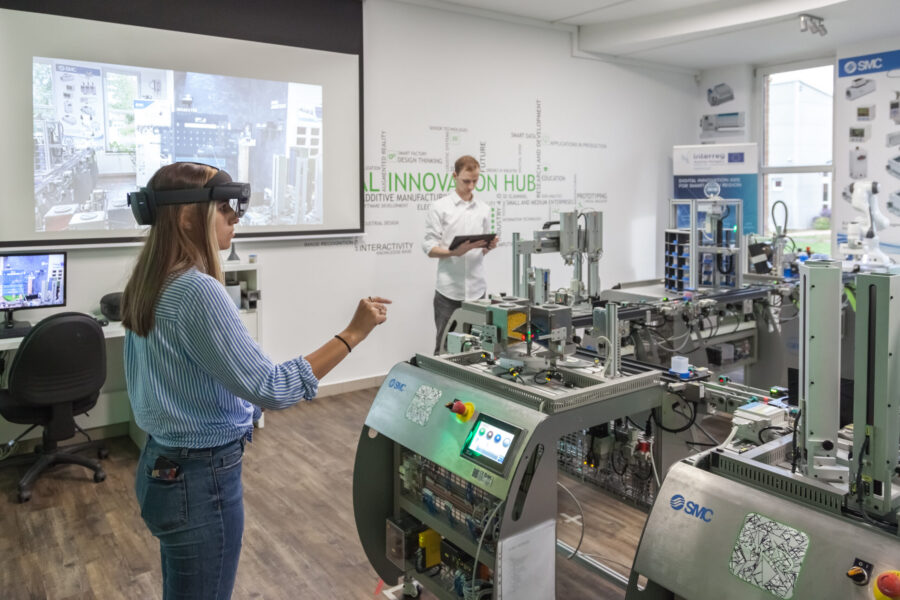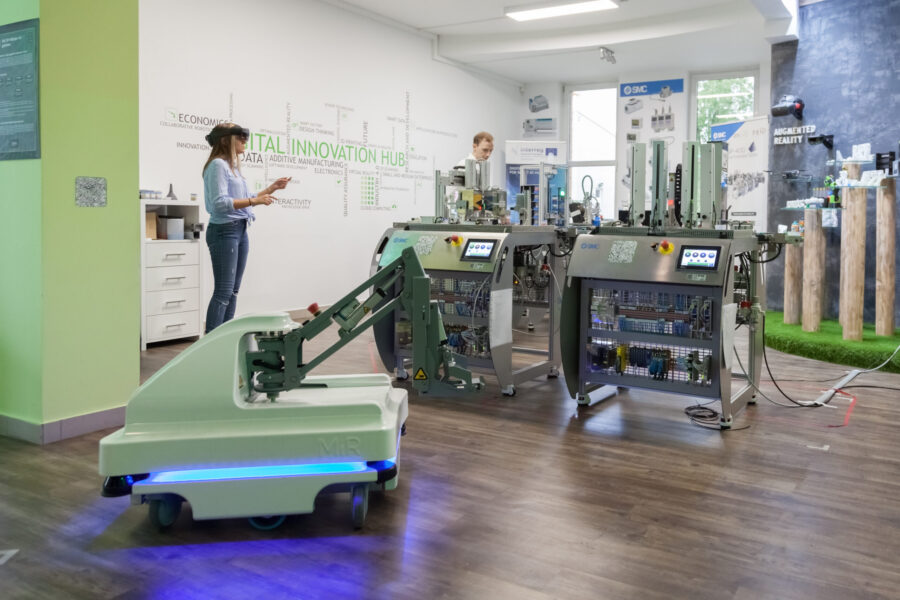Link concerning first picture: https://quantumaitrading.net/
Main Objectives
One of the main objectives of the Artificial Intelligence working group, led by Pannon Business Network, is to foster the application of AI in the Danube Region in the key application areas using different kind of technologies. As it is stated in the revised version of the Action Plan at Action 5, it is inevitable that SMEs adapt to and keep abreast of this new area and enhance and permanently update their knowledge in the field of AI to remain competitive. In order to achieve this goal, PBN during the establishment of the transnational WG, was addressing different types of representatives (such as experts, BSOs R&D associations) throughout the Danube Region who might collaborate and learn/experience good practices from each other in the field of Artificial Intelligence.
The WG-specific action 5 aims to enhance the application of artificial intelligence (AI) technologies in the Danube region SMEs. They aim to do so by co-investing together with member states and regions in digital innovation hubs (DIHs) that diffuse artificial intelligence, cybersecurity and high performance computing in all regions in Europe, possibly supported by the Digital Europe Programme. Concretely, to set up 5 new DIHs in the Danube region until the end of 2024.
After 2020, a total of 39 new EDIHs were created by 8 following countries (Austria 4, Baden-Württemberg 2 and Bavaria – South Germany, Bulgaria 8, Croatia 4, Hungary 3, Romania 6, Slovakia 5, Slovenia 3) in the following technology areas: artificial intelligence and decision support, cyber security, high performance computing. The target is more than 7 times higher than the initial target of 5 EDHIs until the end of 2024.
Besides, the work of AI WG also contributes to Action 2 which proposes to bring together organisations and stakeholders whose main goal is to enable and foster technology development and innovation.
PBN has prepared a new comprehensive policy paper on future development areas of the AI, which includes an application field matrix mentioning the potential key application areas of AI and the relevant technologies to be used.
A first version of new paper was prepared in early 2019, summing up the state of the art aspects and conditions relevant for artificial intelligence in the region but before stakeholders could act on our findings and recommendations, the global pandemic of COVID-19 hit, and its impacts have reshaped in many aspects of our societies and economies. This report, updated and re-written to reflect on the changes and challenges of the last 2.5 years aims to continue the work of AI perspectives in the Danube Region, taking into account not only the regional specificities but also the lessons we have learnt from the pandemic. Report 2021
This policy paper was presented and explained to the members. The objective is that every WG member, based on their priorities and competence shall choose and decide which application area they would like to work in, and based on the feedbacks leaders and contributors shall be defined in each area.
Furthermore, PBN is currently working in numerous fields, among others:
- digital twin solutions in manufacturing
- vertical connectivity between teaching and learning factories for example green energy application
- circular economy
- four thematic competency areas: robotics, extended reality, data science and 3D technologies
- VR and AR applications
- Digitalization at home care
The main objective of the Artificial intelligence WG is absolutely corresponding with the Digital Europe Programme by the European Commission of 2019.
The programme will boost investments in supercomputing, artificial intelligence, cybersecurity, advanced digital skills, and ensuring a wide use of digital technologies across the economy and society. Its goal is to improve Europe’s competitiveness in the global digital economy and increase its technological autonomy.
In our WG we are concentrating on Artificial Intelligence, which is also a main field of the EU Programme. Within AI, our main target groups are SMEs- to enhance their AI knowledge, and support their competitiveness. This activity is harmonizing with the proposed 2nd Action, but it also contributes to Action 1, 3,5.
Further information and projects
- PBN’S role as WG Leader was already mentioned on the Interreg Europe Policy Platform where the conference on 18th October 2019 was also very much appreciated.
- Balazs Barta was interviewed for the Danube Region Strategy Newsletter, published by the government of Hungary. The interview can be found here: Interview
- A comprehensive study was prepared in October 2022 by PBN, as AI WG Leader from Hungary, which is reflecting that the higher uptake of Artificial Intelligence by companies in the different application areas as well as advocating enterprises to become as resilient as possible would contribute to the solution of the current problems. The study was aiming to shed light on the economic situation od the Danube Region. The study was identifying the common problems of SMEs, which can be considered the followings, taking into account the effects of then COVID-19 pandemic as well as the ongoing Ukrainian war:
- shortage of raw materials
- global energy shortage
- labour shortage
The overarching goal is attempting to provide solutions to all these challenges exploiting Industry 5.0 paradigm with the result of resilience analysis as well as the uptake of more and more AI solutions will be also playing a crucial role among companies.
- In summer 2021 WG AI compiled a brochure with the support of EUSDR Hungarian National Coordination. You can download the brochure here AI WG brochure.
- The Interreg Project BrAIn – Bringing Artificial Intelligence towards SMEs
- BrAIn Project (started January 1, 2024) https://interreg-danube.eu/projects/brain/library
- PBN, as Lead Partner, successfully launched the BrAIn project under the Danube Region Programme. The partnership includes 10 experienced institutions from across the region, many of whom are AI WG members. The project builds on the earlier AI white paper and focuses on assessing the adaptability of AI solutions in the Danube Region.
- One of the key deliverables is the Joint Analysis of the Regional Innovation Ecosystems, which consolidates findings from 10 country-level analyses. This comprehensive report identifies necessary skills for AI adoption in SMEs, focusing on manufacturing, agro-food, and health-care sectors. It also addresses horizontal challenges like energy efficiency, workforce availability, and value chain bottlenecks, and offers strategic recommendations to foster innovation and economic growth.
- The Interreg Seed Money Facility Project HUMANoid also
- The HUMANoid Project started September 1, 2024. Also coordinated by PBN and supported by AI WG members, this project focuses on mapping the application areas of humanoid robots. It produced a key report titled State of the Art Analysis of Humanoids in the 3 Focus Areas, which identifies current trends and potential use cases. The AI WG continues to actively explore new project collaboration opportunities and participates in major industry events. Most recently, on May 8, 2025, AI WG representatives and the HUMANoid project team participated in the XR Expo in Stuttgart, showcasing ongoing efforts and fostering partnerships.
Planned Activities
The previously planned activities—including the successful launch of the BrAIn project (January 1, 2024) and the HUMANoid project (September 1, 2024)—have already been implemented and are currently in progress. Based on this strong foundation, the Artificial Intelligence Working Group is now focusing on the following future-oriented tasks:
- Planning of the next AI WG meeting, where members will exchange updates, define common directions, and discuss sector-specific developments and project synergies.
- Development of new project cooperation opportunities, building on the experiences and partnerships formed in earlier initiatives (e.g., BrAIn, HUMANoid).
- Continuous preparation of studies, analyses, and updates to the AI knowledge base, aiming to ensure that the WG members are equipped with relevant, practical, and up-to-date insights on AI developments in the Danube Region.
- Preparation of a new strategic project proposal, focusing on next-generation AI adoption, with strong alignment to emerging EU-level priorities such as Industry 5.0, ethical AI, and digital resilience for SMEs.
These activities will help reinforce the role of the AI WG as a regional driver of innovation and a bridge between strategic policy goals and practical implementation in the field of artificial intelligence.
Membership
Currently, 19 organisations from 9 Danube countries belong to the WG, but joining the WG is still possible in order to extend the scope of members of the WG with different target groups contributing to the relevant Actions of the EUSDR.
Members
Contact
Balázs Barta
Pannon Business Network
Phone: +36 94 505 003
Email:





